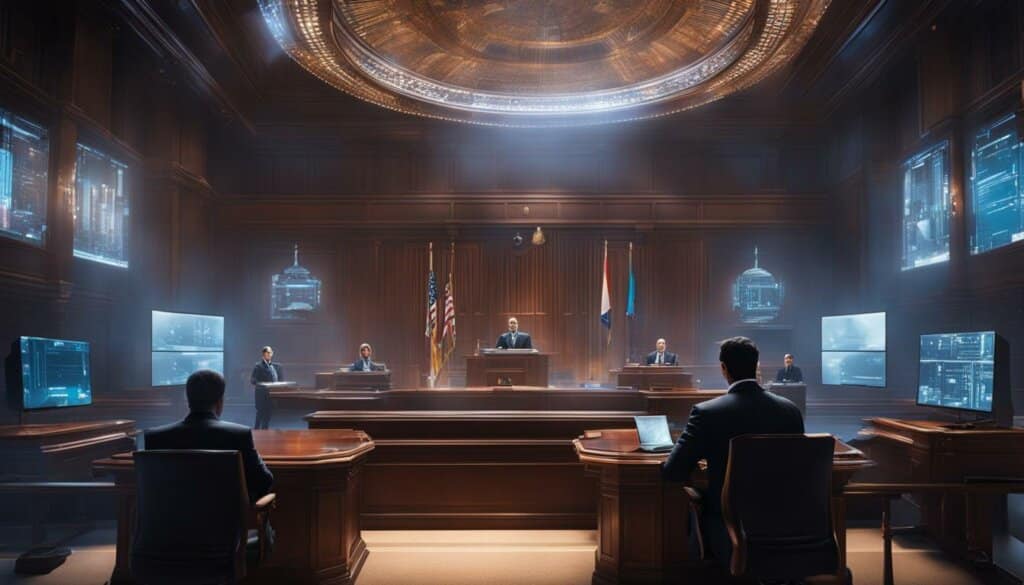Table of Contents
A woman named Felicity Harber recently made headlines when she represented herself in a tax dispute using AI-generated “hallucinations” instead of hiring a lawyer. However, her decision proved to be costly, as she ultimately lost her case.
Harber relied on an AI chatbot to help her source case law and support her appeal against a £3,000 tax penalty related to the sale of her house. Unfortunately, it was later discovered that the cases she cited were fabricated and not based on real legal precedents.
The tribunal ruling stated that the cases must have been AI-generated, as they were “plausible but incorrect” with crucial details differing from real cases. This raises questions about the reliability and accuracy of using AI technology in legal proceedings.
AI technology has made significant advancements in various fields, including healthcare, mental health, psychology, and even therapy. However, the case of Felicity Harber highlights the risks and limitations of relying solely on AI in legal cases.
While AI can provide valuable insights and support, it lacks the critical thinking, judgment, and human expertise that are essential in the legal profession. The Solicitors Regulation Authority has already cautioned against trusting AI platforms in the legal field, emphasizing that these platforms do not have a concept of ‘reality’ and can create false information or “hallucinations.”
It is essential to remember that AI should be used as a complementary tool rather than a replacement for human oversight. Legal professionals need to critically evaluate the reliability of AI-generated information and verify its accuracy through traditional legal research methods.
As we navigate the future of AI in legal proceedings, it is crucial to establish guidelines and safeguards to ensure responsible and ethical use. This includes addressing ethical considerations, maintaining fairness and transparency, and preserving the public’s trust in the legal system.
While AI technology continues to evolve and impact various aspects of our lives, it is vital to strike the right balance between the capabilities of AI and the judgment and expertise of human legal professionals.
The risks of relying on AI in legal cases
The case of Felicity Harber highlights the risks of relying solely on AI technology in legal cases. The Solicitors Regulation Authority has warned lawyers against trusting AI platforms, stating that they “work by anticipating the text that should follow the input they are given, but do not have a concept of ‘reality’.” When an AI creates false information and presents it as true, it is referred to as a “hallucination.” This can lead to wasted time, money, and a sense of cynicism about the legal profession.
The use of AI in the judicial system has raised concerns, with previous instances of AI-generated cases being submitted in court filings and causing complications in legal proceedings.
The impact on the legal profession and the need for human oversight
The use of AI-generated information in legal cases poses significant challenges for the legal profession. While AI can be a valuable tool in streamlining certain tasks and increasing efficiency, it still requires human oversight to ensure that the results are grounded in reality and aligned with legal ethics and standards.
In the recent case of Felicity Harber, she unknowingly relied on AI to select tax cases to support her appeal. However, it was discovered that the cases cited were completely fictitious and not based on real legal precedents. This highlights the potential pitfalls of relying solely on AI-generated information without proper human validation and scrutiny.
Legal professionals play a crucial role in critically evaluating the reliability of AI-generated information and verifying its accuracy through traditional legal research methods. While AI algorithms can assist in gathering and analyzing vast amounts of data, human judgment and expertise remain essential in ensuring fairness, accuracy, and adherence to legal principles.
AI has its limitations, particularly when it comes to complex legal reasoning and interpretation. The complexities and nuances of legal cases often require a deep understanding of context, precedent, and legal principles that may go beyond the capabilities of AI algorithms. Human lawyers bring invaluable insight, experience, and discretion that cannot be replicated by machines.
Therefore, the integration of AI into the legal field should be seen as a complementary tool rather than a complete replacement. Legal professionals should embrace AI as an aid to enhance their work, augment decision-making, and increase efficiency. However, they must remain vigilant in overseeing and validating AI-generated information to ensure its accuracy and ethical implications.
By striking the right balance between the capabilities of AI and the expertise of legal professionals, the legal field can harness the potential of AI technology while maintaining the necessary human oversight and accountability. This collaborative approach will enable the legal profession to leverage the benefits of AI while upholding the integrity, ethics, and quality of legal practice.

| AI Applications in the Legal Field | Impact |
|---|---|
| Legal research and document analysis | Streamlined and efficient analysis of legal documents, reducing time and costs |
| E-discovery and data management | Efficiently identify and organize relevant documents for legal cases |
| Contract analysis and management | Automate contract review, extraction of key terms, and risk identification |
| Legal prediction and case outcome analysis | Assist in analyzing precedents and predicting potential case outcomes |
| Legal chatbots and virtual assistants | Provide basic legal guidance and support to clients |
Lessons learned and the future of AI in legal proceedings
The case of Felicity Harber has highlighted the inherent limitations and risks associated with relying solely on AI in legal proceedings. It serves as a powerful reminder of the importance of ethical considerations, the need for human oversight, and the careful evaluation of AI-generated information.
While AI technology has the potential to offer valuable insights and support, it should be used in conjunction with traditional legal research methods and the expertise of legal professionals. The case of Felicity Harber underscores the necessity for legal practitioners to critically assess the reliability and accuracy of AI-generated information, ensuring it aligns with established legal precedents and standards.
As we move forward, it is crucial to learn from these mistakes and develop comprehensive guidelines and safeguards to ensure responsible and ethical use of AI in the legal field. This includes considering the potential impact on fairness, transparency, and the public’s trust in the legal system. By striking the right balance between human judgment and AI’s capabilities, we can shape a future where AI technology complements and enhances legal proceedings, yielding more accurate and reliable outcomes.
FAQ
What is AI-generated “hallucinations” in the context of legal cases?
AI-generated “hallucinations” refer to false information created by artificial intelligence and presented as true. In the legal context, it can lead to inaccurate case law references or fabricated precedents.
Why did Felicity Harber lose her tax case despite using AI chatbot?
Felicity Harber lost her tax case because the cases she cited, sourced by the AI chatbot, were found to be fabricated and not based on real legal precedents.
What are the risks of relying solely on AI technology in legal cases?
Relying solely on AI technology in legal cases poses risks such as the creation of false information, wasted time and money, and a sense of cynicism about the legal profession.
What has the Solicitors Regulation Authority cautioned lawyers about regarding AI platforms?
The Solicitors Regulation Authority has cautioned lawyers against trusting AI platforms, stating that they “work by anticipating the text that should follow the input they are given, but do not have a concept of ‘reality’.”
What challenges does the use of AI-generated information pose for the legal profession?
The use of AI-generated information in legal cases challenges the legal profession by requiring critical evaluation of its reliability. It highlights the need for human oversight and verification through traditional legal research methods.
How did the case of Felicity Harber highlight the need for human oversight in AI technology?
Felicity Harber’s case exemplified the need for human oversight in AI technology as her reliance on AI resulted in the submission of fictitious cases. This demonstrates the importance of human judgment and expertise in the legal field.
What lesson can be learned from the case of Felicity Harber?
The case of Felicity Harber teaches us the limitations and risks of solely relying on AI in legal proceedings. It underscores the importance of ethical considerations, human oversight, and critical evaluation of AI-generated information.
How should AI be used in conjunction with traditional legal research methods?
AI should be used as a complementary tool in conjunction with traditional legal research methods. Human judgment and expertise should be utilized to verify the accuracy and reliability of AI-generated information.
What is the future of AI in legal proceedings?
The future of AI in legal proceedings lies in striking the right balance between human judgment and the capabilities of AI technology. It requires establishing guidelines and safeguards to ensure responsible and ethical use of AI, considering its impact on fairness, transparency, and public trust in the legal system.













